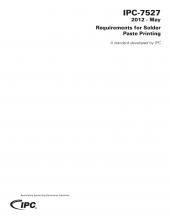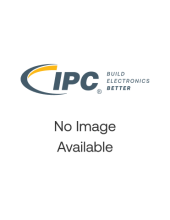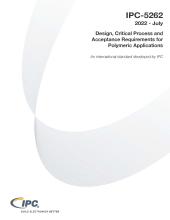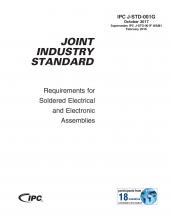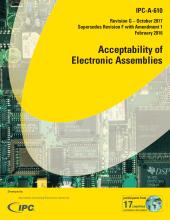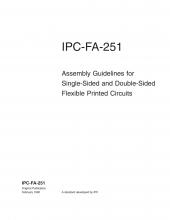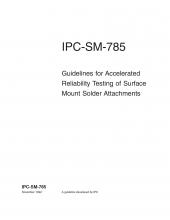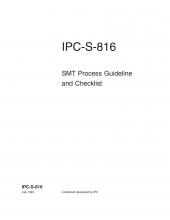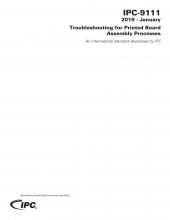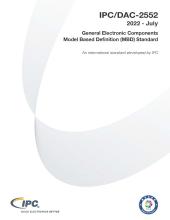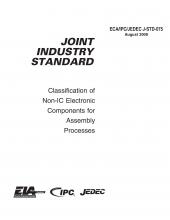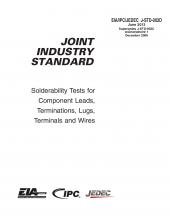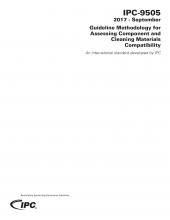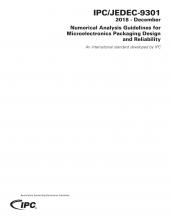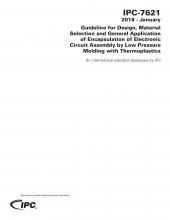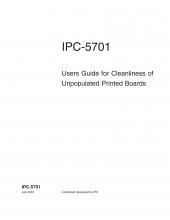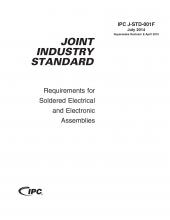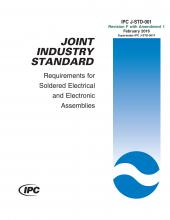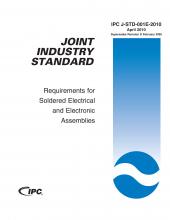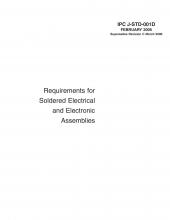Your results
Document #
Language
Products
This standard is a collection of visual quality acceptability criteria for solder paste printing. It provides a standardized language for solder paste characterization. It provides users with common descriptions and potential causes for solder paste deposits. The standard provides valuable insights to the solder paste printing operations which can be used in troubleshooting of the printing process...
Establishes mechanical drop and shock and test guidelines for assessing solder joint reliability of printed board assemblies from system to component level. This document addresses methods to define mechanical shock use-conditions, methods to define system level, system printed board level and component test board level testing that correlate to such use conditions and guidance on the use of...
This document will provide insight into the theory behind tin whisker formation as it is known today and, based on this knowledge, potential mitigation practices that may delay the onset of, or prevent tin whisker formation. The potential effectiveness of various mitigation practices will also be briefly discussed. References behind each of the theories and mitigation practices are provided. It...
The IPC-5262 prescribes the minimum design, critical process and acceptance requirements for the application of polymeric materials to electrical/electronic components, modules, printed wiring assemblies and other elements thereof. The intent of IPC-5262 is to establish a baseline of requirements, procedures, practices and process attributes based on lessons learned and best practices that have...
J-STD-001 is recognized globally for its criteria on soldering processes and materials. Updated with participants from 18 countries providing input and expertise, this document brings the latest criteria along with new graphics to the industry for ease of use and comprehension. This is a must-have for those in the electronics industry with an interest in the process and acceptance criteria for...
IPC-A-610 is the most widely used electronics assembly acceptance document. Updated with participants from 17 countries providing input and expertise, this document brings the latest criteria along with many new and revised graphics to the industry. This is a must-have for inspectors, operators and others with an interest in the acceptance criteria for electronic assemblies. IPC-A-610 is developed...
Guidelines for the assembly of components and mounting hardware to single- and double-sided flexible printed wiring. These guidelines describe the type of materials and processes that may be used to accomplish proper electronic assembly. 30 pages. Released February 1992.
Guidelines for accelerated reliability testing of surface mount solder attachments when evaluating and extrapolating the results of these tests towards actual use environments of electronic assemblies. 50 pages. Released November 1992.
Why waste time looking for answers? This handy, easy-to-use troubleshooting guide lists all types of processing problems and solutions for surface mount assembly. Covers bridging, skips, misalignment, placement and more. 38 pages. Released July 1993.
The IPC-9111 handbook is a valuable resource for anyone involved in manufacturing or purchasing printed board assemblies. Issues in the assembly process are presented along with possible causes and actions to take to resolve them. Photos are provided throughout the document to assist the reader. IPC-9111 supersedes the printed board assembly sections of IPC-PE-740A.
The IPC/DAC-2552 standard was developed jointly with the Digital Association of China (DAC), with the purpose to use Model Based Definition (MBD) to realize efficient and high-quality digital design of board-level assembly, support electronic assembly virtual manufacturing, and enabling the digitalization from requirement to product realization for printed board assemblies. The IPC/DAC-2552...
IPC-A-610F with Amendment 1 incorporates the requirements of IPC-A-610F and IPC-A-610F Amendment 1 into one document. Criteria are presented in a seamless IPC-A-610 format, and there are no redline marks. This document is the equivalent to using IPC-A-610F and IPC-A-610F Amendment 1. IPC brings this version to industry to minimize confusion for those using both documents and those wishing to...
This document addresses the implementation of optical and optoelectronic packaging technologies. The areas discussed include: technology choices, design considerations, material properties, component mounting and interconnecting structures, assembly processes, testing, application, rework, and reliability of completed optoelectronic products. Optoelectronic packaging technologies include active...
This voluntary standard establishes minimum requirements for the design, installation, operation and maintenance of electrically heated process equipment in order to minimize electrical hazards and prevent fires that may occur in combustible tanks, tank liners and drying equipment.
J-STD-075 picks up where J-STD-020 left off by providing test methods to classify worst-case thermal process limitations for electronic components. Classification is referenced to common industry wave and reflow solder profiles including lead-free processing. The classifications represent maximum process sensitivity levels and do not establish rework conditions or recommended processes for an...
This standard prescribes test methods, defect definitions, acceptance criteria, and illustrations for assessing the solderability of electronic component leads, terminations, solid wires, stranded wires, lugs and tabs. A test method for the resistance to dissolution/dewetting of metallization is also included in the standard. Intended for use by both vendors and users, J-STD-002D was developed by...
The IPC-9505 standard provides details of test methodologies for cleaning chemistry compatibility with electronic assembly materials that replace those in MIL-STD-202 Method 215 for testing electronic and electrical components such as capacitors, resistors, transformers and inductors. The test methods can also be used, when applicable, to parts not covererd by military specifications or drawings
The IPC/JEDEC-9301document is an effort to standardize and document some of the basic tenets of a typical Finite Element Analysis (FEA) model, as well as, to educate new designers (and in some cases even experienced designers) on the basic information and best practices that should be captured and provided to technical reviewers of the results of FEA data.
Encapsulation, for the purpose of IPC-7621 standard, is defined as a low pressure molded thermoplastic, e.g., polyamide, which is brought to a liquid state and injection molded and (rather quickly) returned to a temperature below its melting point., forming a durable yet pliable (rubbery-like) form. The desired performance characteristics of low pressure molding (LPM) encapsulation depend on the...
Tackling PCB cleanliness is a tough job; residues on printed circuit boards are directly related to the reliability of the produced hardware and can result in serious failures if not known or monitored. But how do you measure "cleanliness"? How clean is "clean"? The IPC-5701 provides guidance into how these issues should be approached and specified in purchasing documents, addressing levels of...
IPC J-STD-001F is recognized worldwide as the sole industry-consensus standard covering soldering materials and processes. This revision includes support for both traditional solder alloys and for lead-free manufacturing. Examples of some of the significant changes are revision to plated-through hole, PTH, minimum fill requirements; criteria for two new SMT termination types; and expanded...
J-STD-001F with Amendment 1 incorporates the requirements of J-STD-001F and J-STD-001F Amendment 1 into one document. Criteria are presented in a seamless J-STD-001 format, and there are no redline marks. This document is the equivalent to using J-STD-001F and J-STD-001F Amendment 1. IPC brings this version to industry to minimize confusion for those using both documents and those wishing to...
J-STD-001E is recognized worldwide as the sole industry-consensus standard covering soldering materials and processes. This revision includes support for lead free manufacturing, in addition to easier to understand criteria for materials, methods and verification for producing quality soldered interconnections and assemblies. The requirements for all three classes of construction are included...
Download the free Amendment 1 (.pdf) that resolves conflict in measles criteria between J-STD-001D, IPC-A-610D, IPC-6012B and IPC-A-600G. Lead free acceptance criteria and pictures now included! Reformatted-easier to find acceptance criteria! Space Applications Electronic Hardware Addendum Published November 2006, with Amendment 1 Published September 2009. Download the Addendum. J-STD-001D is...
Originally developed for J-STD-001B, it is also applicable to current assembly standards. Electronics manufacturers are faced with the difficult task of proving that a candidate manufacturing process can produce acceptable hardware, either to the customer of the product, or for internal quality control. Users have to determine many of the process qualification steps on their own. This document...
Coming Soon
IPC-7095E: Design and Assembly Process Implementation for Ball Grid Arrays (BGAs)
IPC-7530B: Guidelines for Temperature Profiling for Mass Soldering Processes (Reflow & Wave)
IPC-2294: Design Standard for Printed Electronics on Rigid Substrates
IPC-6904: Qualification and Performance Specifications for Printed Electronics on Rigid Substrates
IPC-4105: Specification for Metal Base Copper Clad laminates for Rigid Printed Boards

